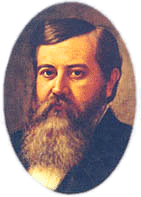|
|
Richard Bennett (Dick) Hubbard, Jr. (1832-1901), governor of Texas and diplomat, son of Richard Bennett and Serena (Carter) Hubbard, was born in Walton County, Georgia, on November 1, 1832. He spent his formative years in rural Jasper County, Georgia. He graduated from Mercer Institute (now Mercer University) in 1851 with an A.B. degree in literature and was elected National University Orator, a high honor at Mercer. He briefly attended lectures at the University of Virginia, then went to Harvard, where he was awarded the LL.B. in 1853. Later that year he and his parents moved to Smith County, Texas, where they settled in Tyler and then on a plantation near the site of Lindale. Hubbard first entered politics in 1855, when he opposed the American (Know-Nothing) party. In the 1856 presidential election he supported James Buchanan, who appointed him United States district attorney for the western district of Texas, a position he resigned in 1859 to run for the state legislature. He served in the Eighth Legislature, where he supported secession. After his failure to win election to the Confederate States Congress from the Fifth District, he recruited men for the Confederate forces. During the Civil War he commanded the Twenty-second Texas Infantry regiment and served in the Trans-Mississippi Department in Arkansas and Louisiana. Hubbard's postwar law practice, supplemented by income from real estate and railroad promotion, enabled him to resume his political career by 1872, when he was chosen presidential elector on the Horace Greeley ticket. He was elected lieutenant governor in 1873 and 1876 and succeeded to the governorship on December 1, 1876, when Richard Coke resigned to become a United States senator. Hubbard's gubernatorial term was marked by post-Reconstruction financial difficulties, by general lawlessness, and by the fact that the legislature was never in session during his administration. Though political opponents prevented his nomination for a second term, he remained popular with the people of Texas. His accomplishments as governor include reducing the public debt, fighting land fraud, promoting educational reforms, and restoring public control of the state prison system. When he left the governorship in 1879 he was the object of acrimonious political and personal attacks. In 1884 Hubbard served as temporary chairman of the Democratic national nominating convention. He campaigned vigorously for the party nominee, Grover Cleveland, who appointed him minister to Japan in 1885. His oratory gained him the cognomen "Demosthenes of Texas." His four years in Japan marked a delicate transitional period in Japanese-American relations. Under American and European influences, Japan was emerging from feudalism and dependency and had begun to insist on recognition as a diplomatic equal, a position Hubbard strongly supported. He concluded with Japan an extradition treaty, and his preliminary work on the general treaty revisions provided the basis for the revised treaties of 1894-99. When he returned to the United States in 1889, he wrote a book based upon his diplomatic experience, The United States in the Far East, which was published in 1899. Hubbard was a Freemason, a member of the Smith County Agricultural and Mechanical Society, and a member of the board of directors of Texas A&M. In 1876 he was chosen Centennial Orator of Texas to represent the state at the World's Exposition in Philadelphia. There he urged national unity and goodwill in an acclaimed oration. Hubbard was a Baptist. He was first married to Eliza B. Hudson, daughter of Dr. G. C. Hudson of Lafayette, Alabama, on November 30, 1858; one daughter of this marriage, Serena, survived. Hubbard's second marriage, on November 26, 1869, was to Janie Roberts, daughter of Willis Roberts of Tyler. Janie died during Hubbard's mission to Japan, leaving him a second daughter, Searcy. Hubbard lived his final years in Tyler, where he died on July 12, 1901. He is buried in Oakwood Cemetery, Tyler. Hubbard in Hill County is named for him. BIBLIOGRAPHY: Jean Sutherlin Duncan, Richard Bennett Hubbard: Texas Politician and Diplomat (Ph.D. dissertation, Texas A&M University, 1972). Martha Anne Turner, Richard Bennett Hubbard (Austin: Shoal Creek, 1979). Jean S. Duncan Reprinted with permission from the Handbook of Texas Online, a joint project of the Texas State Historical Association and the General Libraries at the University of Texas at Austin. © 2003, The Texas State Historical Association.
|
